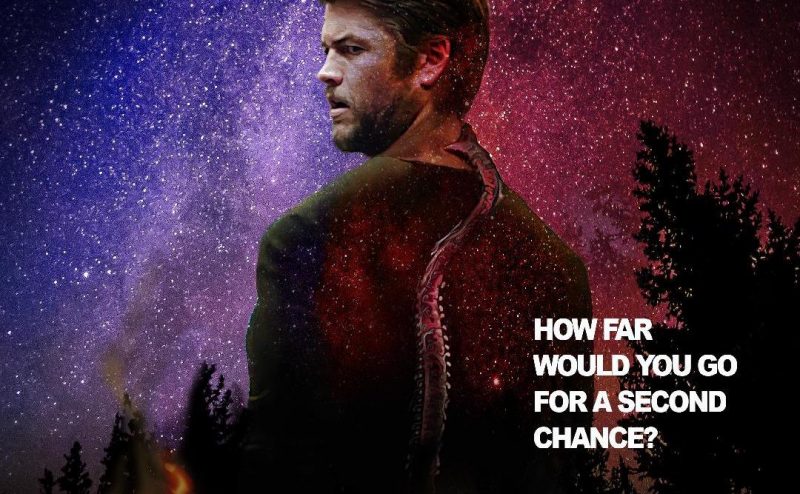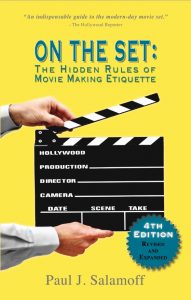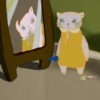
Filmmaking | Interviews | Massachusetts | New England
Boston Sci-Fi Film Fest Interview: Paul J Salamoff
A discussion with director Paul J Salamoff about the East Coast premiere of his film Encounter, the importance of film, escapism of sci-fi and giving back to the film community.
Written by Suzy Cosgrove | Posted by: NewEnglandFilm.com
Director Paul J Salamoff discusses his film Encounter, a science fiction film about an otherwordly object crashes into a field and into the life of artist Will Dawkins, and the metaphor of trying to find your way back from being lost.
The premise of Director Paul J Salamoff’s film Encounter is science fiction story that turns all the tropes on their side. After losing his daughter in a car accident, Will Dawkins, played by Luke Hemsworth, and his friends discover an alien object in a field. Will this alien cause the destruction of the rest of Will’s life, or be the key to getting back what he lost?
Salamoff will premiere the film on the east coast at the Boston Sci-Fi Festival on February 16, 2019 at 7 pm in the Somerville Theatre. Here, he talks with NewEnglandFilm.com Writer Suzy Cosgrove on the importance of film, the escapism it provides, and how Encounter is a metaphor for healing.
Suzy Cosgrove: Can you start off just giving me a quick intro about yourself and what inspired you to delve so deeply into Sci-Fi?
Paul J. Salamoff: I’ve been a fan of Sci-Fi since I was five years old. My parents took me to a double feature of Star Wars and Logan’s Run at the drive-in, in Cape Cod, where my eyes just bugged out of my head and I think at that point, I was just completely hooked on Sci-Fi. I discovered Star Wars, then Star Trek, Outer Limits, Twilight Zone, Doctor Who...I just loved what you could do with science fiction, you know? The sky’s the limit. Sci-Fi and horror is what I most identify with. I love all genres of film, but those are the two genres that really meant something to me because horror is a very visceral genre while science fiction is a very cerebral, adventure drama.
SC: What made you want to take that step of deciding that’s what you wanted to do with your life?
Salamoff: So I grew up in Natick, Massachusetts, which is a very sports-centered community and I didn’t really fit in too well there as a sci-fi geek who didn’t play or care about sports. For me it was movies, science fiction and so forth. My dad took me to a convention in Boston where I saw Special Make-Up FX Artist Tom Savini (who did Friday the 13th, Creepshow and Dawn of the Dead) and he had brought all these props from the movies he had done and I thought to myself, “This guy makes monsters for a living!” I turned to my dad and said “That’s what I want to do.”
My father and grandfather happened to be dentists…and it just so happened that the stuff they use in makeup effects…is dental stuff! So my dad, knowing I wasn’t going to be a dentist, taught me how to use alginate, plaster and dental acrylic so I was able to experiment on my own while I worked at movie theatres and video stores until I was fortunate enough to get into USC. I was able to start working in the industry right away with an internship where I was able to work directly on TV series and movies, so I went back to school for one semester until I realized that I was doing what I was out there to do.
Now 14 years later I’ve had a career as a makeup effects artist working on over 40 films, 10 TV shows, and more commercials than I can even count, with the lowest budget to the highest budget.
Once Jurassic Park came out all of us started to worry that we’d be out of a job, and I had always wondered what else I could do in the industry. I enjoyed writing and always had aspirations of writing a movie because that would be the ultimate. So whenever I had time between effects jobs, I would be writing screenplays and I started getting screenwriting opportunities when people really started to take me seriously as a screenwriter.
From there I just sort of fell into being an executive because I’ve always been very organized, when doing makeup effects I ended up being the guy that was running the shop.
SC: I feel like producers always end up becoming producers that way. I feel like it’s not too many people that set out to be a producer—you start off doing something else and start to realize that you’re really good at figuring out how to make things more efficient.

Salamoff’s book On the Set.
Salamoff: That’s exactly right, and I was realizing that in order to get stuff done, I had to do it myself. So I ended up producing some projects and sort of fell into being an executive. I ended up being offered a position as Vice President of Production for David Lancaster Productions, and then he brought us over to Bold Films which went on to produce films like Nightcrawler and Drive.
I ended up leaving the executive position so I could really focus on my writing, which was starting to take off. I started writing comic books, graphic novels (Discord and Tales of Discord), and I also wrote On the Set: The Hidden Rules of Movie Making Etiquette, which is something I’m very proud of. It’s basically everything you need to know about working on a film set with interviews with over 90 people in the industry including people like James Gunn, Wes Craven, Gale Anne Hurd, Greg Nicotero, Doug Jones…and, to me, it’s really an expression of how I feel about the industry and a way to give back to it as well. You know, I wish I had a book like this when I started.
SC: Me too! As a young PA that would have been enormously helpful.
Salamoff: Yes that’s the thing! When I was a young makeup effects artist I would go on set and I’d get yelled at for things because it’s not like anyone told me the rules of etiquette for each department. And there really weren’t any books out there that would do that. But now this is used in film schools, which I’m really proud of.
I feel that success is defined by maintaining your integrity and being able to look yourself in the mirror everyday and saying I got to where I am because of hard work and not because I stepped on anybody.
So then my writing sort of led me to directing, Encounter being my first feature film as a director.
SC: Can you tell me a little bit about what inspired this movie?
Salamoff: I’m a big fan of science fiction, like I said, specifically of Twilight Zone, Outer Limits and especially Black Mirror, which is incredible. The thing I love most about science fiction is speaking about the human condition in very contextual ways. So when I was given the opportunity to write and direct my own feature, I made a promise to myself that I was going to do something that I felt would be special. To tell a story that would haunt people, or make people think and want to discuss.
SC: That’s why I go to the movies…
Salamoff: Me too! As I said, I’m obsessed with movies and joke that I am the sole reason Movie Pass failed, I was seeing way too many movies with it. It’s not like I don’t have a very social life, I do!
SC: I think movies are extremely social, as are video games, even though it sounds counterintuitive. There’s such a community around film. There’s a reason why movies always do well no matter what’s going on in the economy—because people will always want to go and escape their lives for two hours. And I think Sci-Fi really lends itself to that thought. It transports you to another universe, but then once you’re sitting on it for a while you start to realize, “Wait a second…that was actually a lot like this situation going on in my life.” It’s all a metaphor, and it helps you process things better.
Salamoff: I could not agree with you more. You know what’s funny is that people are always talking about vacations, but vacations for me are not going to a foreign place, a vacation for me is going to see a movie. When I’m emotionally invested in these people I’m watching on screen, I’m out of my own head and you’re right, you forget about your life for a little while. All the escapism I need is in movies. That’s what they mean to me.
Since I’ve seen so many movies, I didn’t want to repeat anything I just wanted to have my own voice and tell a story that hasn’t been told before, or tell it in a different way. So I wanted to use the tropes of science fiction and sort of turn them on their head. I wanted to tell a story about loss, grief and the fear of the unknown but ultimately about hope. And because of budget restrictions we couldn’t be telling a huge space epic.
SC: That’s better though, it challenges you to think differently about things and forces you to cut out all the things that don’t serve the story, which always makes for a better movie.
Salamoff: Yes—every scene needs to drive the story forward. At the time I was writing Encounter I was going through a difficult time in my life and it was a cathartic way for me to deal with what was happening…. So in the story [of Encounter] you have a main character that just wants to get back to living and get back what he lost, but he’s built this protective wall around himself that’s not allowing him to move forward. But then this thing comes into his life, and we don’t know if this is a positive or a negative thing, is this going to be the thing that allows him to move forward and get back what he lost? All of the characters surrounding him have also experienced or are experiencing loss in some way – loss of faith, loss of a job, loss of money, etc.
SC: I think we’re all a little bit lost in some way so it’s really important to have that cast of characters there that have experienced those losses because everyone seeing the film will be able to relate to a character in some way.
Salamoff: That was important to me, in really trying to get to how you deal with grief and how do you move forward. The moving uses these tropes “you find something in a field and bring it home” but Encounter then takes it in a different direction that you weren’t expecting. So I’m really trying [in this movie] to use people’s expectations against them. My goal was to have people walking out of the theatre wondering if they just saw something terrifying, or if they just saw something beautiful, and want to discuss it, then see it again. I’m constantly telling you throughout the movie what’s going on, but it’s totally out of context because you’re not focused on it. So when you watch the movie again you’ll say “Oh, there’s a clue there…”
SC: Those are the best movies, the ones you want to go have a beer with your friends and talk theories, and then go see it again the next day.
Salamoff: Well that’s the kind of movie I had hoped to make!
Encounter is having its East Coast premiere on Saturday February 16th, 2019 at 7pm at the Somerville Theatre as part of the Boston Sci-Fi Film Festival. On the Set is available at Amazon and bookstores everywhere.










